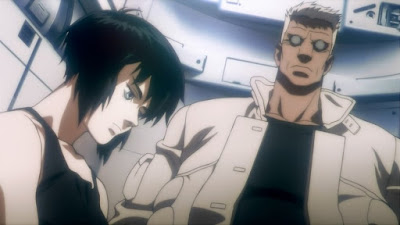If you have never seen Ghost In The Shell, and are only aware of the subsequent television programmes and other films, you really should track it down and give it a watch; it's a masterpiece of posthumanist fiction. Yes, Ghost In The Shell is a slow-burn, think-piece about the line between human and machine, punctuated with gorgeous action scenes and extreme violence, but the focus is on higher philosophical ideas and the intersection between politics and technology. In the 21st century, Public Security Section 9 are a small, elite squad in the Tokyo police, tasked with dealing with high-end cyber crimes, their field leader is Mokoto, an enigmatic woman who has gone "full cyborg"; only her brain remains human. When an elusive hacker known only as The Puppet Master pops up in the latest case for Section 9, things spiral out of control quickly, as the Japanese and American governments battle for control of what may be an unshackled AI, Mokoto and Section 9 are caught in the middle.
For fans of the Stand Alone Complex series of anime, the first Ghost In The Shell can be off-putting, not only for its favouring heavy themes over action, but also because many of the recognisable characters have less depth of personality than in later productions. Ghost In The Shell is a true Science Fiction film, in that the existence of fictional science drives the narrative; in this instance, posthumanist prosthesis that blurs the line between life and machine. Mokoto spends several scenes wondering how "human" she really is, if her brain, and potentially just her mind, can be moved from one body to another, especially when she may not even own her own body. One genius element of this film that I had completely forgotten was that the members of Section 9, possibly excluding Togusa, have their weapons-grade cyborg bodies provided by the Government, meaning that retirement may mean death or being a brain in a jar for their remaining days. I know I've seen this idea in cyberpunk media before, but damn is it good and feels really relevant in the world we now live in.
Although the character models aren't as sharp as they will be in later media, Ghost In The Shell is a beautiful film, with many of the backgrounds being hand-painted and plenty of chance to see them in some of the slower sequences. The music, composed by Kenji Kawai, is far more atmospheric and futuristic than all the synthwave and cyberwave you can find on YouTube for your cyberpunk gaming, though is sadly hard to get your hands on these days, at least legitimately. For those wondering, I'm not going to mention the manga here, nor the infamous sex scene from it, only to mention that how technology has influenced Mokoto's sexuality and how she was written are certainly things I will be talking about down the track. Back in the day, Ghost In The Shell was a big deal, with pretty much every nerd and cult film fan I know gushing over it, but now it seems to have faded from memory. If you enjoy The Matrix, Cyberpunk 2077 or any bleeding-edge tech sci-fi of the past couple of decades, go check out Ghost In The Shell to see where a lot of the visual elements you know came from. It's pretty much a masterpiece.


No comments:
Post a Comment